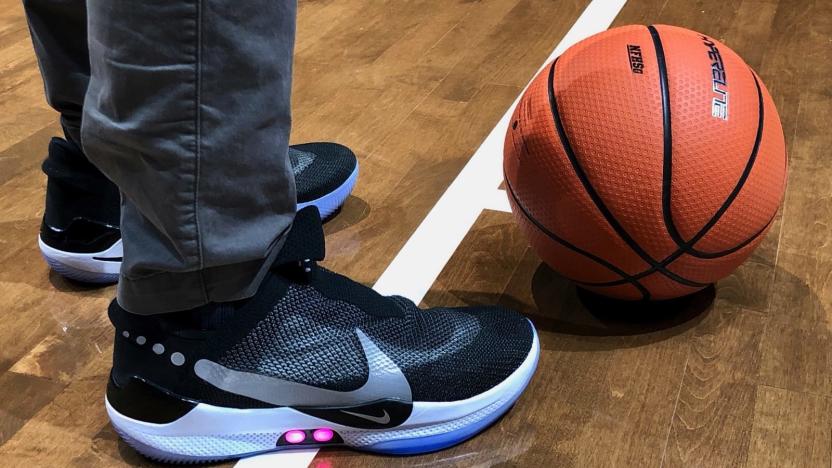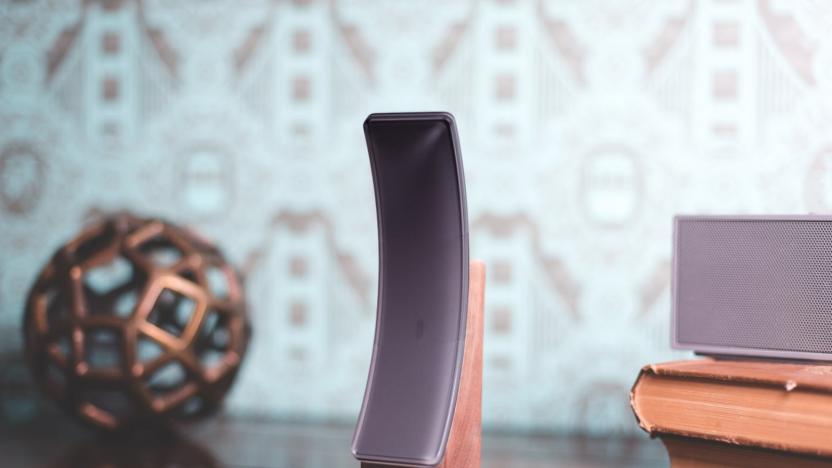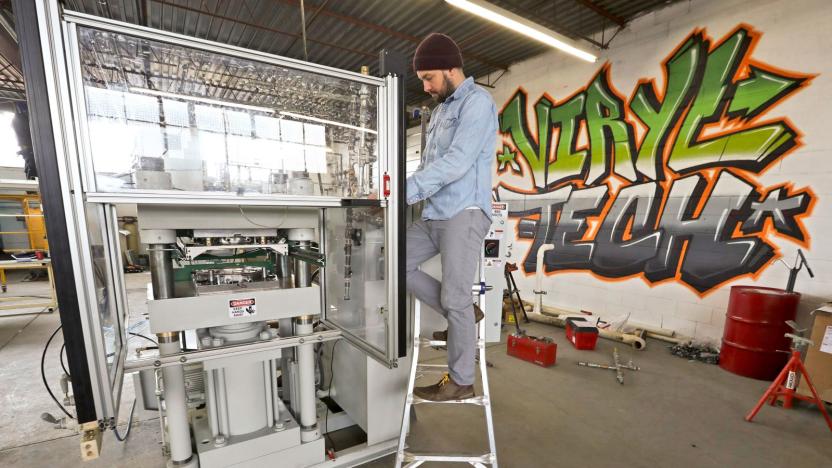InternetOfThings
Latest

Sony built an IoT chip with a 60 mile range
Sony is quietly launching a chip that could change how e-bikes, cars, street lamps and all kinds of other connected devices can relay information. The module, when installed on any IoT object, will allow it send data to Sony's proprietary low-power wide area (LPWA) ELTRES network launching this fall. It can transmit up to about 60 miles and work in noisy urban environments on objects moving at high speeds, opening up a lot of new applications in security, monitoring, tracking and more.
Steve Dent05.28.2019
Nike's self-lacing Adapt BB shoes aren't playing well with Android phones
How do you know you're living in the future? When your shoes have technical problems. Owners on Google Play and CNET report that Nike's Android companion app for the self-lacing Adapt BB has some teething troubles, most notably a buggy firmware update process. In some cases, the updates have bricked people's shoes -- yes, that's something we just said. You can still wear the shoes and force-restart them, but that's not really something you should worry about with a $350 pair of kicks.
Jon Fingas02.20.2019
Battery-free sensor tag gathers energy from radio frequencies
Sensors play a crucial role in the Internet of Things, but there's one glaring limitation: they need a battery or some other conspicuous power source to run. Soon, however, they might only have to pluck energy from the air. Wiliot has shown off a Bluetooth sensor tag that gathers energy from ambient radio frequencies, whether it's Bluetooth, cellular or WiFi. All the ARM-based chip needs is a basic antenna printed on paper or plastic -- after that, it can transmit info like weight and temperature without any kind of battery involved.
Jon Fingas01.15.2019
So, you got an IoT device for the holidays
IoT devices are at once a grotesquerie for the security- and privacy-conscious, and a delicious, convenient poison. And chances are pretty good you got one as a holiday gift. You might say we're in the heyday of IoT — though a significant number of infosec professionals might be more inclined to call it the apex of the Internet of Shit. They have a point. Even just a glance at recent headlines is enough to convince anyone that the so-called smartness of these products is a bit lacking.
Violet Blue12.28.2018
Apple buys privacy-minded AI startup Silk Labs
Apple has been on a AI-centric hiring spree this year, having lured over Google's former AI chief to head a new team combining its core machine learning and Siri groups as well as numerous software engineers. Somewhere along the way it also quietly acquired privacy-centric AI startup Silk Labs, per The Information.
Saqib Shah11.21.2018
California may ban terrible default passwords on connected devices
California looks set to enact a law that aims to protect connected devices against hackers. The state senate has sent Governor Jerry Brown draft legislation that could beef up security across the vast ocean of smart gadgets.
Kris Holt09.19.2018
Samsung patches multiple SmartThings Hub security flaws
Samsung's SmartThings hub suffered from 20 vulnerabilities that could have allowed attackers to control the internet-of-things devices connected to it. Thankfully, security intelligence firm Cisco Talos discovered the flaws and worked with the Korean company to resolve the issues, allowing Samsung to release a firmware update that patches them for all affected customers. Talos admits in its report that some of the vulnerabilities would've been difficult to exploit, but attackers can combine several at once to launch a "significant attack on the device."
Mariella Moon07.28.2018
Tommy Hilfiger tracks, rewards you for wearing its smart clothes
How do you convince everyday people to serve as unofficial ambassadors for a fashion brand? Make smart clothes, apparently. Tommy Hilfiger is launching a Tommy Jeans Xplore garment line that uses embedded Bluetooth smart tags (connected to the company's iOS app) to provide "one-of-a-kind rewards and experiences" to buyers. The more you wear the clothes, the more points you earn -- basically, you're getting a handful of perks for becoming a walking billboard.
Jon Fingas07.26.2018
Smart record presses promise consistent audio quality at a global scale
The manufacturer of what's one of the best sounding record pressing machines today is taking a step into the future. Viryl Technologies recently announced its WarmTone and LiteTone models will soon connect to the internet. After a test pressing is complete, an engineer will upload the press' settings to the cloud. The promise is two records that sound near-identical regardless if one was made in America and another in Germany. That consistency is important, as the sound quality and audio characteristics can vary wildly from record to record, plant to plant and pressing to pressing. Every one of its 40ish machines across the globe will operate from the same data for each album.
Timothy J. Seppala07.20.2018
Domestic abusers are exploiting smart home devices
Smart home devices are supposed to make life easier, but it's now apparent that their convenience carries unintended consequences for domestic abuse survivors. The New York Times has conducted interviews showing that abusers are exploiting smart speakers, security cameras, doorbells and other connected devices to control, harass and stalk their targets. The perpetrators will not only spy on their partners, but cause havoc with bursts of music, sudden changes in lighting or temperature and other attempts at intimidation.
Jon Fingas06.24.2018
Google's IoT platform Android Things is open to all developers
To help folks build software to make their hardware products play nice with the Internet of Things, Google announced at the end of 2016 it would create a toolkit called Android Things. It was released in preview to select developers, but today it's available to all of them.
David Lumb05.07.2018
Qualcomm designed new chipsets just for IoT gadgets
Instead of continuing to repurpose existing processors for smart home devices, Qualcomm has unveiled two new chipsets built specifically for IoT gadgets. The QCS605 and QCS603 are 10nm system-on-chips (SoCs) that will power things like 360-degree cameras, robot vacuums and smart displays from companies like Ricoh Theta and Kedacom. Qualcomm also launched a Vision Intelligence Platform today that provides frameworks like the company's AI Engine, and the Snapdragon Neural Processing Engine (NPE) to enhance on-device machine learning. It'll also offer SDKs for camera processing and computer vision so that companies who buy these processors can more easily create applications for their products.
Cherlynn Low04.11.2018
BlackBerry's post-phone future includes IoT security
BlackBerry hasn't been shy about shifting its focus away from hardware and toward technologies you can find inside others' devices, such as self-driving cars and secure comms. If you need any further proof, though, you just got it: BlackBerry has struck a deal with Swiss electronics maker Punkt to secure an upcoming range of Internet of Things devices. In theory, the embedded security tech will ensure they can connect to your home or office network without creating glaring vulnerabilities. Details of the devices themselves weren't mentioned, but it's safe to presume they'll be more advanced than the power accessories and cordless phones that represent Punkt's current lineup.
Jon Fingas03.07.2018
Samsung's Bixby leader leaves for Google
Samsung's ambitions in services just took a bit of a blow. ZDNet has learned that Samsung's software research CTO Injong Rhee has left the company to become an "Enterpreneur in Residence" at Google. The 7-year veteran was important to the development of Samsung Pay and the company's Knox security platform. He also led the initial deployment of Samsung's in-house AI assistant, Bixby. Whatever you think of those products, he made them stand out -- no mean feat in a company better-known for its cutting-edge displays and processors than its software.
Jon Fingas02.13.2018
Cubinote prints colorful sticky notes from your smartphone
Even with all the reminder and to-do apps out there, plenty of people are still fond of physical sticky notes. And if you don't want to pick one over the other, there's a startup trying to bring the best of both worlds together. Cubinote is a Bluetooth- and WiFi-enabled printer that pairs with an iOS or Android app to make sticky notes on the fly. The company says the product could come in handy if you, say, want to leave it at your home office and send reminders or other random notes to it from your workplace. Or if your parents don't live in the same city as you and you want to send them messages every now and then.
Edgar Alvarez01.11.2018
Watch the best of Samsung's CES 2018 press conference in 12 minutes
Some of Samsung's biggest announcements broke cover before the company's big CES press conference, but that didn't stop a parade of execs from sharing their vision of a Samsung-fueled future. If they have their way, we'll be brainstorming on connected whiteboards, commuting in DRVLINE-powered autonomous cars and talking to Bixby a lot. More than anything, though, Samsung tried to paint a picture of how it will take all of its disparate products and weave them together into a cohesive ecosystem. It's fascinating stuff, but we're not sure the presentation had to be an hour long. To prove it (and to help you easily catch up on the company's biggest news), we put together a 12-minute supercut you can check out above. Click here to catch up on the latest news from CES 2018.
Chris Velazco01.08.2018
A smart insole pairs with an app to track how tired you are
Two years ago, at CES 2016, we found a pair of smart shoes that could be "laced" by simply tapping a virtual button on a smartphone app. Now, the company behind those sneakers, Zhor Tech, has brought its latest creation to CES 2018: a connected shoe insole. The device is loaded with sensors that count your steps, detect your fatigue levels, analyze your posture and detect any rough vibrations around you. Zhor Tech says that its Safety insole was designed specifically for people who work in construction and other field jobs.
Edgar Alvarez01.07.2018
These smart shoes alert you if your grandma falls
We've seen our fair share of smart shoes at CES in the past, including a pair you can "lace up" using your smartphone. And today, at CES, we came across some more interesting footwear. What you see above are the "smart shoes with falling alert," created by a French startup called E-Vone. As the name suggests, the kicks feature a system that will notify friends, family or medical services if the person wearing them happens to take a fall. The company says they're designed for older adults (like your grandma or grandpa), as well as construction workers, hikers or anyone who feels like they may require assistance if they're alone indoors or outdoors.
Edgar Alvarez01.07.2018
Vodafone branches out into internet of things things
The UK's major carriers have mobile all sewn up, and after a bit of broadband here and TV there, they're turning to other things to get their kicks, grow their brands and pad their bank accounts. For O2, that meant moving into smart home gear, and for Vodafone, that means launching a range of internet of things (IoT) devices under the banner "V by Vodafone." Available to Vodafone customers in the UK and a handful of other European countries from today is a car telematics dongle, pet tracker, bag tracker and connected camera, with more products due to join this launch lineup next year.
Jamie Rigg11.07.2017
Google and others back Internet of Things security push
Rather than becoming ubiquitous in homes as expected, the Internet of Things (IoT) has become the butt of jokes, in part because of major security and privacy issues. UK mobile chip designer ARM -- which created the architecture used by Qualcomm, Samsung and others -- has a lot to lose if it doesn't take off. As such, it has unveiled a new security framework called Platform Security Architecture (PSA) that will help designers build security directly into device firmware.
Steve Dent10.23.2017